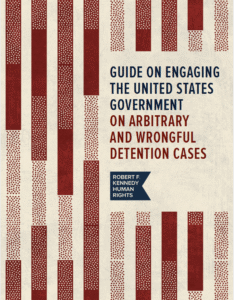On May 14, 2020, Robert F. Kennedy Human Rights together with Human Rights Awareness and Promotion Forum (HRAPF) and Sexual Minorities Uganda petitioned the U.N. Working Group on Arbitrary Detention to press Uganda to release 19 LGBTI individuals who were arrested March 29, together with four others after the Uganda Police Force raided the well-known Children of the Sun (COSF) LGBTI shelter in Kampala. The individuals were accused of violating Uganda’s stay-at-home orders and social distancing directives, which require people to stay at home and prohibit gatherings of more than 10 people in order to curb the spread of COVID-19.
Even though they were in total compliance with the COVID-19 restrictions at the time of their arrest, these 19 individuals were nevertheless charged with engaging in “negligent acts likely to spread infection of disease” and “disobedience of a lawful order.” While the police released four people on health grounds the following day, 19 remained in arbitrary detention until May 19. Reports later revealed that the police initially charged them with engaging in “carnal knowledge,” in violation of Section 145 of the Ugandan Penal Code, a homophobic colonial-era provision that criminalizes same-sex sexual relations and is routinely used in Uganda to target LGBTI individuals. In local media footage of the raid, neighbors of the shelter and area leaders said they were worried about the “homosexual behavior” of the youths in the COSF shelter, and Mayor Hajji Abdul Kiyimba is seen whipping and verbally lashing out at two of the shelter residents while forcing them to admit that they are homosexuals.
Following tremendous pressure from Ugandan civil society and the international community, the 19 individuals were finally released after 49 days in detention (during which they were routinely denied access to their lawyers), and the senseless charges against them were dropped.
This case is part of a broader trend in which governments around the world, not just Uganda, are exploiting the COVID-19 pandemic to target already marginalized groups. Many have imposed measures aimed at curbing the rate of transmission, including restricting freedom of movement and requiring social distancing, and have declared states of emergency or handed down restrictions through emergency directives. Although some of these measures seem necessary to stop the rapid spread of the virus, others appear to be a pretext to further marginalize already vulnerable groups and drastically restrict civic space – under the guise of protecting public health.
In Zimbabwe, for example, President Mnangagwa declared the coronavirus pandemic to be a national disaster and the country to be in a state of emergency. He followed up 13 days later by instituting a 21-day “total” lockdown curtailing movement within the country, shutting down most business and suspending flights in and out of Zimbabwe. In enforcing these lockdown measures, state security forces have brutally assaulted and violated civilians. One of them, activist Cecilia Chimbiri, was arrested and sexually assaulted by security forces after protesting the state’s failure to provide for the poor during COVID-19. These directives have also been used to target journalists for doing their work. Panashe Makufa, a freelance journalist, was arrested and assaulted in Harare when he was caught photographing police who were trying to disperse crowds while enforcing lockdown measures. In response to the increasing reports of violence and harassment of civilians through COVID-19 enforcement measures, a Zimbabwe high court ordered state security forces to stop assaulting citizens while enforcing the country’s coronavirus lockdown.
The Ethiopian government has similarly declared a state of emergency and employed COVID-19 restrictions that are having a chilling effect on freedom of speech. On March 27, authorities arrested journalist Yayesew Shimelis for his comments on social media criticizing the government’s response to coronavirus, accusing him of spreading “false news” and holding him in custody for nearly three weeks without charge. He was eventually formally charged under the country’s new hate speech law, whose language has been heavily criticized by rights groups for its infringement on freedom of expression.
Somalia, too, has targeted journalists who attempt to cover the pandemic. On April 14, Somali police arrested Abdiaziz Ahmed Gurbiye, an editor and director of a privately owned media group, for his posts on Facebook criticizing President Farmaajo’s response to COVID-19 and alleging that the president had redirected ventilators donated to a local hospital to his own office. Gurbiye was detained for 5 days and accused of spreading “false news” that offended the honor of the president.
While acknowledging the need for a rapid response to curb transmission of COVID-19, respect for human rights and the protection of civic space now more than ever needs to be ensured. For governments to do otherwise, would risk further widening existing inequalities and exacerbating already prevalent rights violations.




